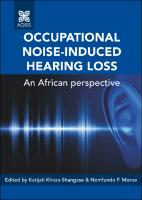Occupational noise-induced hearing loss
An African perspective
| dc.contributor.author | Khoza-Shangase, Katijah | |
| dc.contributor.author | Moroe, Nomfundo F. | |
| dc.contributor.author | Ntlhakana, Liepollo | |
| dc.contributor.author | Petrocchi-Bartal, Luisa | |
| dc.contributor.author | Musiba, Zumbi | |
| dc.contributor.author | Madahana, Milka C.I. | |
| dc.contributor.author | Nyandoro, Otis T.C. | |
| dc.contributor.editor | Khoza-Shangase, Katijah | |
| dc.contributor.editor | Moroe, Nomfundo F. | |
| dc.date.accessioned | 2023-03-20T15:35:59Z | |
| dc.date.available | 2023-03-20T15:35:59Z | |
| dc.date.issued | 2022 | |
| dc.identifier | ONIX_20230320_9781779952264_7 | |
| dc.identifier.uri | https://library.oapen.org/handle/20.500.12657/61950 | |
| dc.description.abstract | Within the well-documented understanding of occupational noise-induced hearing loss (ONIHL) being a complex occupational health condition requiring the adoption of the complex interventions approach to management, challenges confronting hearing conservation programmes (HCPs) within the African context need clear characterisation and insightful deliberation. Guided by the systems theory, to be realistic about the implementation, monitoring, as well as evaluation of outcomes of HCPs within the African mining context, this book is a call for a paradigm shift in the assessment and management of ONIHL and HCPs in African mines. This book, Occupational noise-induced hearing loss: An African perspective, equips researchers involved in the management of ONIHL and implementation of HCPs with evidence that allows for contextually relevant best practices in mine settings, particularly those located in low- and middle-income countries (LMICs). This best practice is multidisciplinary in nature and engages all stakeholders in all relevant sectors, with the goal of adopting a preventive audiology approach to ONIHL rather than the compensation-oriented approach that is currently prevailing. This book is a research-driven contribution to the occupational health and safety (OHS) space, with ONIHL as a focus case study, and it provides contemporary, contextually relevant, and responsive evidence related to ONIHL and HCPs in LMICs with a very specific focus on the South African context. This book expansively addresses all aspects of ONIHL and HCPs in one volume, with careful considerations of complexities and challenges to HCPs implementation, applicable specifically to LMICs, although useful globally. The book offers potential solutions and recommendations for all challenges identified, having carefully and deliberately engaged with local evidence, local context, and local policies and regulations to ensure an Afrocentric contribution to the world of evidence. | |
| dc.language | English | |
| dc.subject.classification | thema EDItEUR::M Medicine and Nursing::MJ Clinical and internal medicine::MJP Otorhinolaryngology (ENT)::MJPD Audiology and otology | en_US |
| dc.subject.other | Audiology | |
| dc.subject.other | Africa | |
| dc.subject.other | hearing | |
| dc.subject.other | hearing loss | |
| dc.subject.other | hearing impairment | |
| dc.subject.other | hearing intervention | |
| dc.subject.other | ear-and-hearing health care | |
| dc.title | Occupational noise-induced hearing loss | |
| dc.title.alternative | An African perspective | |
| dc.type | book | |
| oapen.identifier.doi | 10.4102/aosis.2022.BK249 | |
| oapen.relation.isPublishedBy | d7387d49-5f5c-4cd8-8640-ed0a752627b7 | |
| oapen.relation.isbn | 9781779952264 | |
| oapen.imprint | AOSIS Publishing | |
| oapen.pages | 286 | |
| oapen.place.publication | Cape Town |

